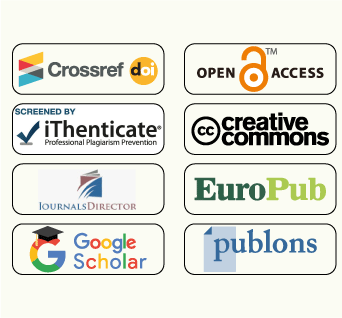Egypt and the Global Value Chain: A Road Map Proposal
Abstract
This research aims to identify the current status of Egypt's participation in the global value chain (Strengths, Weaknesses, Opportunities, and Threats) while highlighting the main requirements and obstacles that face such participation.
· MethodologyThe paper investigates the current status of Egypt's participation in the global value chain, adopted the qualitative approach through conducting semi-structured interviews with all relevant parties from the governmental and private sectors in addition to experts in the field. Also, a focus group was conducted with relevant parties to analyze the current status of Egypt's participation in the global value chain and to identify the obstacles it faces. These qualitative data were analyzed using narrative data analysis methods
· FindingsFrom the semi-structured interviews and the focus group, it was concluded that Egypt has many weaknesses and challenges that limit its participation in the global value chain. Accordingly, all sectors must work on linking the domestic value chain with regional and global value chains.
· Research limitationsThis research only used structured interviews and focus groups as research instruments. Nevertheless, more research methods, such as surveys with significant stakeholders, could be used in future research to increase its value and relevance.
· Practical implicationsThe paper provides a road map proposal to increase Egypt's participation in the global value chain, with a review of the role of different sectors to link the domestic value chain with regional and global value chains.
· Originality/valueThis paper proposed a road map to enhance the participation of Egypt in global value chains. Also, the paper advanced detailed action plans for different involved sectors, such as trade and investment, export and logistics, the international and multimodal transport sector, and the scientific research sector.
Keywords
Full Text:
PDFReferences
Ajakaiye, O. & Jerome, A. (2019) Sub-Saharan Africa’s development experience and policy practice, 1960–2018. In: Nnadozie, E. & Jerome, A. (eds.) African economic development. Bingley: Emerald Publishing Limited, pp. 497-519. Available from: https://doi.org/10.1108/978-1-78743-783-820192025 [Accessed 30th Dec. 2020].
Allianz (2020). Global supply chain survey: In search of post-Covid-19 resilience. Euler Hermes Economic Research. Available from: https://www.allianz.com/en/economic_research/publications/specials_fmo/2020_12_10_Supplychainsurvey.html [Accessed 23rd Feb. 2021].
Al-Najjar, W. (2019) The application of global value chains in the economies of developing countries. Practical Journal of Trade and Finance. 39 (1), 491-522. Available from: https://www.albayan.ae/across-the-uae/news-and-reports/2019-06-26-1.3591859 [Accessed 30th Dec. 2020].
European Bank (2020) Global value chains diagnostic – Country deep dive -Egypt. Available from: file:///C:/Users/user/Downloads/GVC%20country%20diagnostic_Egypt%20(4).pdf [Accessed 5th July 2021].
Felix R. (2020) The COVID-19 economy: Does it mean the end of globalization. World Economic Forum. Available from: https://www.weforum.org/agenda/2020/05/globalisation-covid19-gdp-drop-2008-financial-crisis [Accessed 7th Jan. 2021].
Giovannetti, G. & Vannelli, G. (2020) Global value chains’ participation and development opportunities: Hints from the product space. EMNES Working Paper. 43. Available from: https://emnes.org/wp-content/uploads/2020/09/emnes_wp_043_gvc_participation_and_development_opportunities.pdf [Accessed 7th Jan. 2021]
Giroud, A. & Mirza, H. (2015) Refining of FDI motivations by integrating global value chains’ considerations. Multinational Business Review. 23 (1), 67-76. Available from: https://doi.org/10.1108/MBR-12-2014-0064 [Accessed 25th May 2021].
Information and Decision Support Center (2020) Future directions - Egypt’s value-added chains and shifts in global trade prospects. Available from: https://www.idsc.gov.eg/IDSC/DocumentLibrary/View.aspx?id=3932 [Accessed 25th May 2021].
Javorsek, M. & Camacho, I. (2015). Trade in value-added: Concepts, estimation, and analysis. ARTNeT Working Paper. No.150. Bangkok: United Nations. Available from: https://vdocuments.mx/trade-in-value-added-concepts-estimation-and-analysis-in-value-on-gross.html [Accessed 25th May 2021].
Laker, B. (2020). Severe implications of Coronavirus on global trade. Forbes. Available from: https://www.forbes.com/sites/benjaminlaker/2020/04/07/3-severe-implications-of-coronavirus-on-global-trade/?sh=f3756813d110 [Accessed 25th Dec. 2020].
Osabuohien, E., Efobi, U. R. & Gitau, C. M. (2015) Environment challenges in Africa: Further dimensions to the trade, MNCs and energy debate. Management of Environmental Quality: An International Journal. 26 (1), 118-137. Available from: https://doi.org/10.1108/MEQ-04-2014-0058 [Accessed 18th Dec. 2021].
Report of the Information and Decision Support Center (2020). Future directions - global value chains. Egypt’s Economy. 2. Available from: https://www.idsc.gov.eg/IDSC/DocumentLibrary/View.aspx?id=3932 [Accessed 30th Dec. 2020].
Sankar, P. & Jones, N. L. (2007) Semi-structured interviews in bioethics research. In: Empirical methods for bioethics: A primer (Advances in Bioethics, 11). Jacoby, L. & Siminoff, L. A. (eds.) Bingley: Emerald Group Publishing Limited, pp. 117-136. Available from: https://doi.org/10.1016/S1479-3709(07)11006-2 [Accessed 30th Dec. 2020].
The European Bank for Reconstruction and Development (EBRD) (2020) Global value chains diagnostic – Country deep dive - Jordan. Available from: file:///C:/Users/user/Downloads/GVC%20country%20diagnostic_Jordan.pdf [Accessed 8th Jan. 2021].
The Global Competitiveness Report (2018) World Economic Forum. Available from: https://www3.weforum.org/docs/GCR2018/05FullReport/TheGlobalCompetitivenessReport2018.pdf [Accessed 8th Jan. 2021].
Tipi, N. & Elgazzar, S. (2021) Considerations Towards a Sustainable and Resilient Supply Chain: A Modelling Perspective. International Business Logistics Journal (IBL). 1 (1), 6-13.- DOI: https://doi.org/10.21622/ibl.2021.01.1.006
World Bank (2019) Ease of doing business in Egypt. Available from: https://tradingeconomics.com/egypt/ease-of-doing-business [Accessed 30th Dec. 2020].
World Bank Report (2020) Global value chains spur growth but momentum is waning. Available from: https://www.albankaldawli.org/ar/news/press-release/2019/10/08/global-value-chains-have-spurred-growth-but-momentum-is-flagging [Accessed 30th Dec. 2020].
DOI: http://dx.doi.org/10.21622/ibl.2021.01.2.039
Refbacks
- There are currently no refbacks.
Copyright (c) 2021 Dina Samir Elwakkad, Dana Corina Deselnicu

This work is licensed under a Creative Commons Attribution-NonCommercial 4.0 International License.
International Business Logistics
E-ISSN: 2735-5969
P-ISSN: 2735-5950
Published by:
Academy Publishing Center (APC)
Arab Academy for Science, Technology and Maritime Transport (AASTMT)
Alexandria, Egypt
ibl@aast.edu




